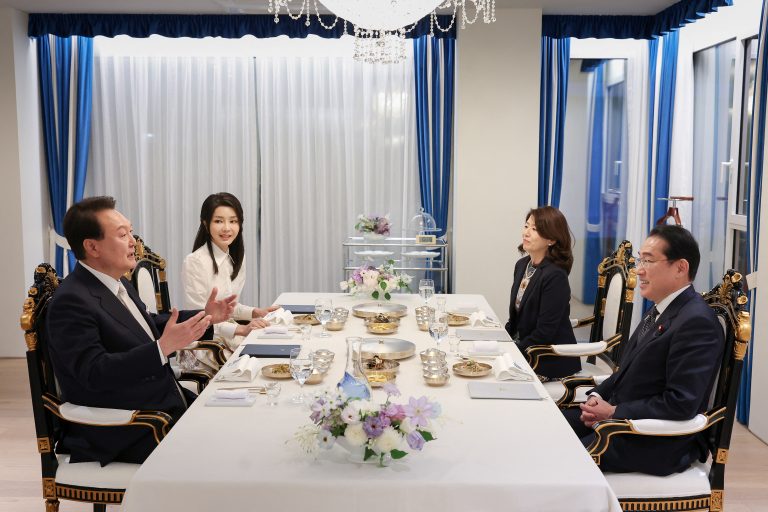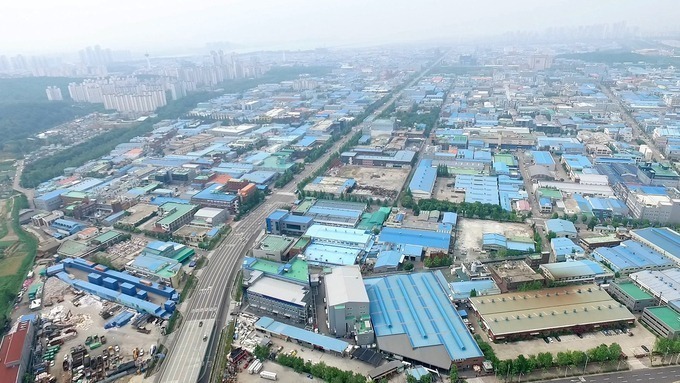[동아시아포럼] 기시다의 방한과 지정학의 승리
기시다 후미오 일본 총리 방한, 러시아 및 중국으로부터의 위협 대응해야 기시다 총리, 강제징용 피해자 대한 개인적 동정심 표명했으나 사과는 없었다 역사적 문제 여전히 지뢰 같은 존재지만 한동안은 협력 관계 유지될 듯
[동아시아포럼]은 EAST ASIA FORUM에서 전하는 동아시아 정책 동향을 담았습니다. EAST ASIA FORUM은 오스트레일리아 국립대학교(Australia National University)의 크로퍼드 공공정책 학교(Crawford School of Public Policy) 산하의 공공정책과 관련된 정치, 경제, 비즈니스, 법률, 안보, 국제관계 및 사회에 대한 분석 및 연구를 위한 플랫폼입니다.
저희 폴리시코리아(The Policy Korea)와 영어 원문 공개 조건으로 콘텐츠 제휴가 진행 중입니다.
2023년 5월 7일부터 이틀간 진행된 기시다 후미오 일본 총리의 서울 방문은 지정학이 역사적 정의 추구를 이겼음을 상징하는 사건입니다. 러시아의 우크라이나 침공과 중국으로 인해 국제질서가 위협받는 등 국제 환경이 그렇게 좋지 못한 탓에 양국의 역사적 문제 해결이라는 과제가 뒤로 밀렸기 때문입니다. 윤석열 한국 대통령과 기시다 총리 모두에게 필요한 일이었죠.

그러나 기시다 총리는 일제의 강제징용 피해자에 대한 사과와 배상이라는 한국 측의 요구에 신중한 태도를 보였습니다. 이후 무역과 안보 측면에서 긴장감이 조성되며 문제는 더 복잡해졌습니다. 하지만 기시다 총리는 한일관계 정상화와 광범위한 공통적 관심사에 대한 협력 강화를 위해 재빠르게 행동했습니다. 북한의 미사일과 핵 개발로 인한 지역 안보, 공급망 탄력성, 중국으로의 고급 기술 유출 방지 등 두 나라의 협력이 필요한 과제는 아주 많습니다.
한국과 일본은 모두 미국의 전략적 기조를 따르고 있습니다. 국가적으로나 정치적으로 생존하려면 조 바이든 미국 대통령 행정부의 세계적, 지역적 우선순위에 자국을 넣어야 한다는 것을 알고 있기 때문입니다.
유명환 전 외교통상부 장관은 동아시아포럼에 “한국은 일본과 좋은 협업 관계를 유지하지 않는 한 미국과의 동맹을 강화할 수 없으며 윤 대통령은 이를 잘 알고 있다”고 전했습니다. 또한 “중국의 괴롭힘 역시 3국 안보협력을 회복하려는 동기가 됐을 수 있다”며 “북한의 핵 위협이 커지는 것은 3국 안보협력을 강화하기 위한 좋은 핑계”라고 덧붙였습니다.
2023년 초에는 한국과 미국의 외교적 교류가 활발히 진행됐습니다. 양국 관계를 극적으로 변화시키겠다는 두 지도자와 미국 측의 의사가 반영된 것이죠. 한일관계는 2023년 3월 초 윤 대통령이 강제징용 문제를 놓고 지지부진하던 협상을 종결하겠다는 결정을 내리면서 달라지기 시작했습니다. 강제징용 문제를 법정으로 가져온 유족과 유가족에게 한국에서 조성된 기금으로 일방적인 제3자 배상을 진행하기로 한 것입니다. 일본 기업이 사과하거나 돈을 낼 필요가 없어졌죠. 윤 대통령은 이 결정을 내린 지 며칠 만에 도쿄를 방문해 양국 정상 간의 정례회담을 재개하고 2019년부터 이어진 상호 간의 무역 조치를 철회하는 등 협업 재개를 위한 협상을 진행했습니다.
이는 2023년 4월 진행된 윤 대통령의 미국 국빈 방문을 위한 초석이기도 했습니다. 이 자리에서는 한국이 핵 개발을 완전히 포기한 대가인, 한국에 대한 확장 억제를 강화하는 워싱턴 선언(Washington Declaration)이 채택됐습니다.
한편 바이든 행정부가 여기에 일본을 추가해 3자 간의 확장 억제 회담을 만들겠다는 목표를 가지고 있다는 이야기도 나오고 있습니다. 윤 대통령은 기자회견에서 워싱턴 선언에 따라 만들어진 핵 협의체에 일본이 참여할 가능성이 있다고 이야기했지만 이후 대통령실은 파장을 우려해 윤 대통령의 발언이 핵 협의체 확대를 의미하는 것은 아니라고 선을 그었습니다. 하지만 한국, 미국, 일본의 3자 간 안보 대화가 북한과 중국, 심지어는 미래에 만들어질지도 모르는 중국과 러시아의 군사 동맹에 강력한 영향을 미칠 것입니다. 이는 2023년의 목표인 미사일 방어에 대한 데이터 공유를 공식화하기 위해 오는 6월 진행될 3국 국방부 장관 회의에서 논의될 것으로 보입니다.
윤 대통령과 기시다 총리는 공동기자회견에 함께 나와 지정학적인 목표를 명확히 언급했습니다. 기시다 총리는 “우리는 동북아시아에 있는 미국의 핵심 동맹국”이라며 일본과 한국은 일본, 한국, 미국 간의 일련의 안보 동맹을 통해 북한에 대한 억지력과 대응 능력을 강화할 것임을 강조했습니다.
하지만 해결되지 않은 역사적 정의 문제를 무시할 수는 없습니다. 기시다 총리의 방한에 앞서 한국의 진보·보수 언론은 기시다 총리가 이전의 발언 수준을 넘어서는 개인적인 사과를 해 일본 기업의 배상 결정을 촉진하길 기대했습니다.
기시다 총리는 일본이 더 이상의 사과를 하거나 일제강점기에 대한 책임을 인정하는 것을 반대하는 일본 극우주의자들의 압력 때문에 그렇게 하지 못했습니다. 하지만 기자들에게 피해자들의 고통에 대해 “마음이 아프다”고 말하는 등 개인적인 동정심을 표명하기는 했죠. 그는 또한 방사능 오염수 방류에 대한 우려를 완화하고자 한국에 후쿠시마 원전 부지 접근권을 부여했습니다. 일본 언론에 의하면 기시다 총리는 윤 대통령이 적절한 대가 없이 일본에 굴복한다고 비판하는 한국 내 여론을 의식해 ‘약간의 양보를 해’ 윤 대통령을 돕고자 했습니다.
이 발언에 대한 한국의 반응은 둘로 나뉘었습니다. 진보적인 정치인과 언론은 이를 아예 무시했고, 윤 대통령의 지지자인 보수층은 기시다 총리가 보여준 진정성에 감사를 표명했습니다. 그러나 보수층 내에서도 약간의 의견 차이는 있었습니다. 유 전 외교통상부 장관은 “기시다 총리는 한국 국민에게 직접 사과하지 않았고, 그럴 만한 정치적 용기가 있지도 않다”고 말했지만, 윤 대통령은 “과거사에 대한 인식 문제는 어느 일방이 상대에게 요구할 수 있는 문제는 아니라고 생각한다”는 발언을 했습니다.
결론적으로 역사적 문제는 여전히 지뢰처럼 묻혀 있습니다. 언제든 터질 가능성이 있죠. 오는 2023년 5월 11일에는 강제징용 피해자들이 미쓰비시 중공업을 상대로 제기한 별도의 임금청구소송 항소심 첫 변론이 진행될 예정입니다. 그렇지만 한동안은 지정학적인 문제로 인해 2023년 초까지의 기조가 유지될 것으로 보입니다.
Kishida’s visit to South Korea and the triumph of geopolitics
Japanese Prime Minister Fumio Kishida’s visit to Seoul on 7–8 May 2023 represents a triumph of geopolitics over the search for historical justice. Both South Korean President Yoon Suk-yeol and Kishida are now driven by the ominous international environment, led by threats to the international order from Russia’s invasion of Ukraine and China.
Kishida remained cautious when responding to South Korean calls for an apology and compensation for the victims of Japan’s colonial and wartime forced labour system. These issues were compounded by later trade and security tensions. But he acted with urgency in restoring normalcy to South Korea–Japan relations and tightening cooperation on a wide range of shared concerns. These concerns spanned from regional security in the face of North Korean missile and nuclear advances to supply chain resiliency and controlling the flow of advanced electronic technology to China.
Both Japan and South Korea are embracing the strategic direction coming from Washington. They understand that their survival, both nationally and politically, depends on subordinating themselves to the US President Joe Biden administration’s global and regional priorities.
‘Korea cannot strengthen its alliance with the United States unless Korea maintains a good working relationship with Japan, and Yoon knows it very well’, former foreign minister Yu Myung-hwan, advisor to Yoon, told me. He added that ‘Chinese bullying might also have been a motivation to restore trilateral security cooperation’ and that ‘increasing North Korean nuclear threats are a good excuse for him to strengthen trilateral security cooperation’.
The compressed diplomatic calendar of early 2023 reflects the determination of both leaders — and their US backers — to accomplish the dramatic shift in relations. The shift in South Korea–Japan relations began in early March 2023 with Yoon’s decision to end deadlocked negotiations on the forced labour issue. Instead, Yoon used a South Korean fund to unilaterally offer compensation to survivors and their families who have gone to court, removing the demand for an apology and payments from Japanese companies. Within days of his decision, Yoon visited Tokyo and took important steps towards returning to a business-like atmosphere.
The Tokyo trip was necessary for Yoon’s state visit to Washington in April 2023. A diplomatic showcase of the alliance is embodied in a ‘Washington Declaration’ that strengthened extended deterrence in return for South Korea forswearing any nuclear ambitions.
There is some indication that the Biden administration now aims to create a trilateral extended deterrence dialogue. Yoon told reporters that Japan might be added to the Nuclear Consultative Group created under the Washington Declaration but his office weakened that formulation as it would undermine his achievement with South Korea. Yet a trilateral security dialogue between Japan, South Korea and the United States would convey a formidable response both to North Korea and to China, and even to a potential Chinese–Russian military axis. It would also lead to a June trilateral meeting between defence ministers which would reportedly formalise data sharing on missile defence — a goal set in 2023.
Both Yoon and Kishida made ample reference to geopolitical goals in their one public appearance together at a joint press conference. ‘We are the key US allies in Northeast Asia’, Kishida said. He also emphasised that Japan and South Korea are seeking to strengthen their deterrence and response capabilities to North Korea through a series of security alliances between Japan, South Korea and the United States.
Still, unresolved issues of historical justice could not just be put aside. Leading up to the visit, progressive and conservative South Korean media expressed expectations that Kishida would go beyond previous statements and make a personal apology — perhaps opening the door to Japanese corporate payments to victims.
Kishida, under pressure from vocal conservatives who oppose any further Japanese apology or admission of responsibility for repression in South Korea, was hesitant to go that far. But he decided to make his personal sympathy for the victims clear — telling reporters that his ‘heart aches’ over their suffering. He also offered South Korea access to the Fukushima nuclear site to allay concerns over radioactive contamination in waters being released. According to Japanese media, Kishida wanted to offer some concessions to bolster Yoon against criticism within South Korea of his eagerness to give in to Japan without much in return.
The gestures met a divided response in South Korea — progressive politicians and media were dismissive and while conservative backers of Yoon were appreciative of Kishida’s apparent sincerity, they were not overwhelmed. Former foreign minister Yu said that ‘Kishida failed to apologise directly to the Korean people and obviously lacks the political courage to do so,’ but that President Yoon ‘believes that begging the other side to apologise is not politically correct’.
This leaves historical issues still buried like landmines, not far from the surface and ready to be set off. More court hearings on forced labour victims in a separate suit against Mitsubishi Heavy Industries are scheduled to start on 11 May 2023. For now, the imperatives of geopolitics will sustain the momentum created by early 2023.



























